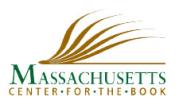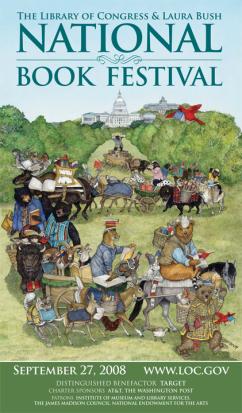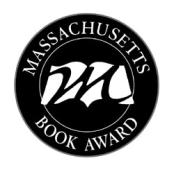This is the first of what I hope will become regular posts to the Public Humanist. I’m writing from the new offices of the Massachusetts Center for the Book, which will officially open its doors this fall on the campus of Historic Northampton.
The office was purpose built, so I’ve been told, to be the gift shop for the Historic Northampton campus, and was for some time- in a happy coincidence – used byNorthampton book binder, Bill Streeter. It juts out from a wonderful white barn that sits at the back of the property and features barn-wood paneling and exposed rustic beams. It’s large enough for us and for our books & or it will be once we get in some more shelves! An added bonus, of course, is that we are now neighbors both with Historic Northampton, with which we have begun to collaborate on cultural tourism, and with the Massachusetts Foundation for the Humanities, which has been one of our supporters since the Center was founded in January of 2000.
Yes, January of 2000. We are approaching our 9th anniversary. Yet, even as we contemplate entering into organizational double digits, many don’t quite know that (a) Massachusetts has a Center for the Book or (b) what a Center for the Book is anyway. Perhaps I can use the rest of this blog to amend that sorry state with readers of the Public Humanist.
The Massachusetts Center for the Book is one of 50 state centers for the book affiliated with the Center for the Book in the Library of Congress. That Center was established in 1977, when Daniel Boorstin was Librarian of Congress, with a broad mission to promote books, reading, literacy, and libraries in our nation. State centers for the book join the national center in that mission and, in addition, develop programs that promote the particular book cultures of their states.
Daniel Boorstin was Librarian of Congress, with a broad mission to promote books, reading, literacy, and libraries in our nation. State centers for the book join the national center in that mission and, in addition, develop programs that promote the particular book cultures of their states.
On the national stage, our Center cooperates with the state center network and the Library of Congress on an annual school-age reading and writing promotion program, Letters About Literature. This is a great project that asks students in Grades 4 through 12 to write letters to authors about  books that have changed their lives. Each year, we receive thousands of letters, and we honor the best of them during a spring awards ceremony at the State House. It’s always a joyous day. And it’s made possible by a generous grant from the Calderwood Writing Initiative at the Boston Athenaeum, which has funded our state program for the past four years. Student letters, as well as photos from the event, are posted at our web site, and I hope you will take a look at what students are saying about the many important connections they are making with books in the 21st century.
books that have changed their lives. Each year, we receive thousands of letters, and we honor the best of them during a spring awards ceremony at the State House. It’s always a joyous day. And it’s made possible by a generous grant from the Calderwood Writing Initiative at the Boston Athenaeum, which has funded our state program for the past four years. Student letters, as well as photos from the event, are posted at our web site, and I hope you will take a look at what students are saying about the many important connections they are making with books in the 21st century.
We also co-host the Massachusetts table in the Pavilion of the States at the National Book Festival, working with our state library agency, the Massachusetts Board of Library Commissioners, on this event. Now in its 8th year, the National Book Festival will be held on September 27th, 2008, on the National Mall, in Washington, DC. Each year, we bring to our table recommended Massachusetts books, examples of commonwealth reading and book promotion programs, and publicity materials that highlight our current year of Massachusetts book award winners. You can read more about the festival – and see which Massachusetts authors will participate this year — at the Library of Congress and Center web sites. This year’s festival poster was created by Massachusetts author/illustrator, Jan Brett.
Commissioners, on this event. Now in its 8th year, the National Book Festival will be held on September 27th, 2008, on the National Mall, in Washington, DC. Each year, we bring to our table recommended Massachusetts books, examples of commonwealth reading and book promotion programs, and publicity materials that highlight our current year of Massachusetts book award winners. You can read more about the festival – and see which Massachusetts authors will participate this year — at the Library of Congress and Center web sites. This year’s festival poster was created by Massachusetts author/illustrator, Jan Brett.
The Massachusetts Book Awards are the first  state-specific program we established, and we have named award winners for each of the years the Center has been in existence. These awards are meant not merely to honor important Massachusetts works of fiction, nonfiction, poetry, and children’s/young adult literature but also to promote their reading in the Commonwealth. Each year, volunteers from across the state create reading and discussion and/or activity guides to encourage adoption of our award and honors titles by reading groups and story times in Massachusetts. We also produce high-quality posters and bookmarks that we offer to libraries and bookstores for promotional displays, and we facilitate connections between authors and libraries to schedule readings and book-signings throughout the award year. In all of these ways, we hope the ‘MassBooks,’ as we call them, connect writers and readers in our commonwealth. This year’s award winners will be announced just after Labor Day, and we’ll hold an awards event at the State House on November 20th. Stay tuned for details.
state-specific program we established, and we have named award winners for each of the years the Center has been in existence. These awards are meant not merely to honor important Massachusetts works of fiction, nonfiction, poetry, and children’s/young adult literature but also to promote their reading in the Commonwealth. Each year, volunteers from across the state create reading and discussion and/or activity guides to encourage adoption of our award and honors titles by reading groups and story times in Massachusetts. We also produce high-quality posters and bookmarks that we offer to libraries and bookstores for promotional displays, and we facilitate connections between authors and libraries to schedule readings and book-signings throughout the award year. In all of these ways, we hope the ‘MassBooks,’ as we call them, connect writers and readers in our commonwealth. This year’s award winners will be announced just after Labor Day, and we’ll hold an awards event at the State House on November 20th. Stay tuned for details.
The second state-specific initiative we have undertaken may well come to be our Center’s lifework, for it is a continually evolving and ever-expanding project: the Literary Map of Massachusetts. This cultural tourism guide to more than 250 literary heritage sites in our Commonwealth was originally funded by the Massachusetts Foundation for the Humanities and developed in cooperation with the English Department at UMass Amherst and with a statewide editorial board. During the course of the development we found many surprises that we were able to capture on our first map, and more than a few sites that are not yet marked. Thus we have begun to develop a related project to mark new literary landmarks in Massachusetts, the first of which will be in Northampton. But this is a topic worthy of its own entry & and so I’ll leave off the particulars for now and hope to be invited back again, soon, to say more about cultural tourism and Massachusetts book culture with a blog entry that focuses on literary mapping.
The Massachusetts Center for the Book is funded by the Boston Athenaeum, Boston Public Library, Massachusetts Board of Library Commissioners, Massachusetts Cultural Council, Massachusetts Foundation for the Humanities, and Simmons College Graduate School of Library and Information Sciences, with campuses in Boston and South Hadley. We also enjoy support from readers like you, and I hope you will read more about us, and stop by in the Fall when we open our Northampton office for book business.


